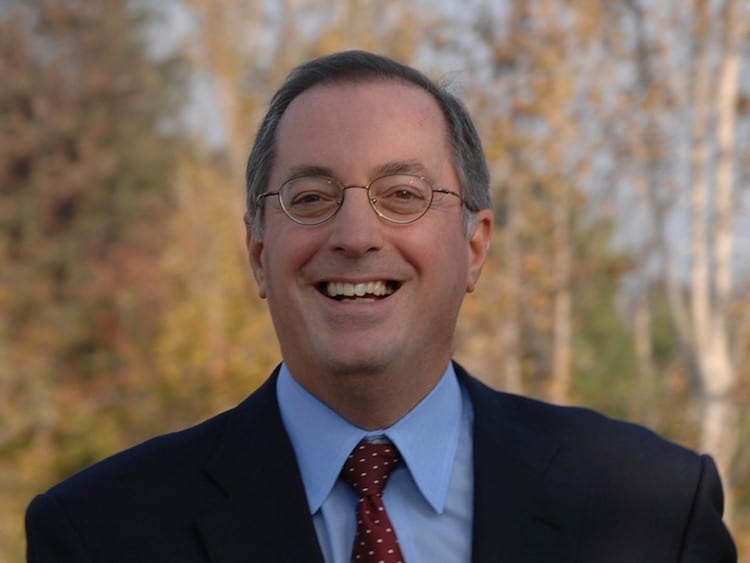
Photo: Intel News
Former Intel CEO Paul S. Otellini, MBA 74, an innovator who left his mark on the computing industry and inspired a global workforce, maintained a lifelong connection with the school he said laid the foundation for his success.
Otellini died Oct. 2 at his home in Sonoma County. He was 66.
The first non-engineer to lead Santa Clara-based Intel, Otellini guided the company to new heights. During his eight-year tenure as CEO of the semiconductor chip and microprocessor maker, Intel generated more revenue than it did during the company’s previous 45 years.
In 2006, Otellini was named Haas Business Leader of the Year for “innovative new strategies … his ability to lead and inspire a global workforce, and for his unwavering commitment to conducting business with integrity.”
“Paul occupies a very special place in the Haas pantheon. More broadly, he was a great citizen,” says Dean Rich Lyons. “He was also super honest, which is part of why he ascended so far and so fast in the corporate world. We’ve lost an important part of our community.”
Laying the foundation for success
In a 2007 interview with CalBusiness magazine, he credited his Haas experience for laying the foundation for his success. “You learn a very thorough, analytical methodology at Haas,” Otellini said at the time. “That has worked extremely well for me in the high-tech industry.”
Otellini led Intel from 2005 until his retirement in 2013. Current Intel CEO Brian Krzanich called Otellini “the relentless voice of the customer in a sea of engineers.”
Otellini never strayed far from Haas, serving on the Haas School Board from 2002-2003. He and his wife, Sandy, were among the earliest benefactors to donate to the Chou Hall capital fund. The couple made a gift of $1 million to the new building. The $60 million facility, used completely for student learning and interaction, opened in August.
“That very early investment was a vote of confidence, and a lot of other people came into the project because he was in,” Lyons says.
For a guy with a non-technical background to be chosen to lead Intel may have struck some as quizzical. But Lyons says it made perfect sense.
“Paul brought a complementary skillset to a company that, at that time, needed it,” he says. “He had an ability to arbitrage business and technology, to understand two somewhat distinct fields and really pull them together.”
“Obsessed with making things better”
Lyons says Otellini’s work embodied Haas’ four Defining Leadership Principles—Question the Status Quo, Confidence Without Attitude, Students Always, and Beyond Yourself—which were established more than three decades after Otellini left Berkeley.
Otellini and Lyons spoke of the Defining Leadership Principles during their periodic lunch meetings over the past decade. Otellini remarked that the principles existed in his own Haas education more than 30 years earlier, even if they weren’t explicitly stated.
“Paul was obsessed with making things better,” Lyons says. “’Question the status quo’ is something where people are saying, ‘Look, there’s got to be a better way here.’ Paul had that in spades. He was confident, but he was grounded, and that’s why people appreciated him so much.”
Otellini was born in San Francisco on Oct. 12, 1950, and remained a fan of the city all his life, according to Intel’s website. He received a bachelor’s degree in economics from the University of San Francisco in 1972 before earning an MBA at Haas in 1974.
Generating record revenue as Intel’s CEO
At Intel, he served in many roles, including chief of staff to former CEO Andy Grove, who co-founded Intel and died in 2016.
From 1990 to 2002, he served as executive vice president and general manager of the Intel Architecture Group, responsible for the company’s microprocessor and chipset businesses and strategies for desktop, mobile, and enterprise computing—and as executive vice president and general manager of the sales and marketing group before becoming chief operating officer, a role he held from 2002 to 2005. As CEO, he grew the company’s sales from $34 billion in 2005 to $53 billion in 2012.
Since retiring in 2013, Otellini dedicated time to mentoring young people and was involved with several philanthropic and charitable organizations, including the San Francisco Symphony and San Francisco General Hospital Foundation.
Otellini is survived by his wife, Sandy; his mother, Evelyn; his son Patrick (Marissa), and daughter, Alexis; grandchildren Nico and Mia, all of San Francisco; and brother Rev. Msgr. Steven Otellini, Menlo Park.
In lieu of flowers, the family kindly suggests donations to the UCSF Foundation, with a note “Dyslexia Center in memory of Paul Otellini,” P.O. Box 45339, San Francisco, CA 94145-0339, or donations to the website makeagift.ucsf.edu, designating “Dyslexia Center” in the “other” gift category.